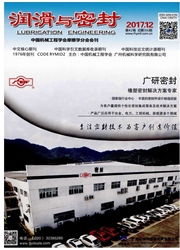

 中文摘要:
中文摘要:
为改善Ti6Al4V表面的生物摩擦学性能,把不同能量与剂量的Ni+注入到Ti6Al4V表面以形成表面改性层。用NanoIndenterⅡ型纳米显微力学探针测定表面改性层的纳米硬度,在MRTR多功能摩擦磨损试验机上以ZrO2球/改性层为摩擦副,以透明质酸钠溶液润滑剂在室温下进行生物摩擦学实验,使用S-3000N扫描电子显微镜观察生物摩擦学试验后试样的磨痕形貌并分析磨损机制。结果表明:Ni+注入Ti6Al4V表面的形成相为Ti2Ni;随着注入能量和剂量增加,改性层中Ti2Ni的质量分数增加,改性层的纳米硬度增加,摩擦因数下降,且磨损出现不同程度的减轻:注入能量增加比剂量增加更有利于提高改性层的生物摩擦学性能。
 英文摘要:
英文摘要:
Ti6Al4V alloys were treated by Ni+ implantation under different doses and energies to improve their biological frictional properties.The nano-hardness was measured by Nano Indenter Ⅱ .Biological friction test was performed on MRTR multifunctional machine under the lubrication of sodium hyaluronate and with ZrO2ball and surface modified layers on Ti6Al4V as the friction pairs.Scanning electron microscope was used to observe the grinding crack.The results show that Ti2Ni is formed in the surface modification layer of Ti6Al4V.With the increasing of doses and energies of Ni+ implantation, the content of Ti2Ni in the surface modified layers is increased, the nano-hardness of surface modified layers is increased and the friction coefficient is decreased, and the wear of surface modified layers is reduced in different degrees. Compared to the increasing of doses, the increasing of energies is more favorable to improve the biological frictional properties of sur- face modified layers of Ti6Al4V
 同期刊论文项目
同期刊论文项目
 同项目期刊论文
同项目期刊论文
 期刊信息
期刊信息
